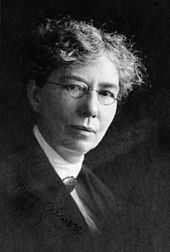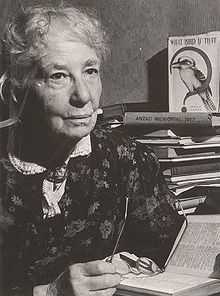Mary Gilmore

Dame Mary Gilmore DBE (16 August 1865 – 3 December 1962) was a prominent Australian socialist poet and journalist.
Early life
Mary Jean Cameron was born on 16 August 1865 at Cotta Walla near Goulburn, New South Wales. When she was one year old her parents, Donald and Mary Ann, decided to move to Wagga Wagga to join her maternal grandparents, the Beatties, who had moved there from Penrith, New South Wales in 1866.
Her father obtained a job as a station manager at a property at Cowabbie, 100 km north of Wagga. A year later, he left that job to become a carpenter, building homesteads on properties in Wagga, Coolamon, Junee, Temora and West Wyalong for the next 10 years. This itinerant existence allowed Mary only a spasmodic formal education; however, she did receive some on their frequent returns to Wagga, either staying with the Beatties or in rented houses.
Her father purchased land and built his own house at Brucedale on the Junee Road, where they had a permanent home. She was then to attend, albeit briefly, Colin Pentland's private Academy at North Wagga Wagga and, when the school closed, transferred to Wagga Wagga Public School for two and a half years. At 14, in preparation to become a teacher, she worked as an assistant at her uncle's school at Yerong Creek. Another uncle, Charles White (1845–1922), was a journalist and author of books on bushrangers.
After completing her teaching exams in 1882, she accepted a position as a teacher at Wagga Wagga Public School, where she worked until December 1885. After a short teaching spell at Illabo she took up a teaching position at Silverton near the mining town of Broken Hill. There Gilmore developed her socialist views and began writing poetry.
Literary career
In 1890, she moved to Sydney, where she became part of the "Bulletin school" of radical writers. Although the greatest influence on her work was Henry Lawson it was Alfred "A. G." Stephens, literary editor of The Bulletin, who published her verse and established her reputation as a fiery radical poet, champion of the workers and the oppressed.
She followed William Lane and other socialist idealists to Paraguay in 1896, where they had established a communal settlement called New Australia two years earlier. At Lanes breakaway settlement Cosme she married William Gilmore in 1897. By 1900 the socialist experiment had clearly failed. Will left to work as a shearer in Argentina and Mary and her two-year-old son Billy soon followed, living separately in Buenos Aires for about six months, and then the family moved to Patagonia until they saved enough for a return passage, via England, in 1902 to Australia, where they took up farming near Casterton, Victoria.
Gilmore's first volume of poetry was published in 1910, and for the ensuing half-century she was regarded as one of Australia's most popular and widely read poets. In 1908 she became women's editor of The Worker, the newspaper of Australia's largest and most powerful trade union, the Australian Workers' Union (AWU). She was the union's first woman member. The Worker gave her a platform for her journalism, in which she campaigned for better working conditions for working women, for children's welfare and for a better deal for the indigenous Australians.
Later life

By 1931 Gilmore's views had become too radical for the AWU, but she soon found other outlets for her writing. She later wrote a regular column for the Communist Party's newspaper Tribune, although she was never a party member herself. In spite of her somewhat controversial politics, Gilmore accepted appointment as a Dame Commander of the Order of the British Empire in 1937, becoming Dame Mary Gilmore.[1] She. was the first person to be granted this award for services to literature. During World War II she wrote stirring patriotic verse such as No Foe Shall Gather Our Harvest.
In her later years, Gilmore, separated from her husband, moved to Sydney, and enjoyed her growing status as a national literary icon. Before 1940 she published six volumes of verse and three editions of prose. After the war, Gilmore published volumes of memoirs and reminiscences of colonial Australia and the literary giants of 1890s Sydney, thus contributing much material to the mythologising of that period. Dame Mary Gilmore died in 1962, aged 97, and was accorded the first state funeral accorded to a writer since the death of Henry Lawson in 1922.
Honours
Gilmore's image appears on the Australian $10 note, along with an illustration inspired by No Foe Shall Gather Our Harvest and, as part of the copy-protection microprint, the text of the poem itself. The background of the illustration features a portrait of Gilmore by the well-known Australian artist Sir William Dobell.
In 1973 she was honoured on a postage stamp bearing her issued by Australia Post.[2]
The Canberra suburb of Gilmore and the federal electorate of Gilmore are named after her.
See also
Notes
References
- "Dame Mary Gilmore". Polymer Bank Notes of the World. Retrieved 17 February 2009.
- Prentis, Malcolm. "Great Australian Presbyterians: The Game". Uniting Church in Australia. Archived from the original on 11 December 2006. Retrieved 7 March 2007.
- Whitehead, Anne. Bluestocking in Patagonia: Mary Gilmore's Quest for Love and Utopia at the World's End, Allen & Unwin, 2003
Further reading
- W.H.Wilde, Courage a Grace – Melbourne University Press (1988)
- Dymphna Cusack and others, Mary Gilmore: A Tribute (1965)
- W H Wilde and T Inglis Moore, Letters of Mary Gilmore (1980)
- Gavin Souter, A Peculiar People – The Australians in Paraguay
|